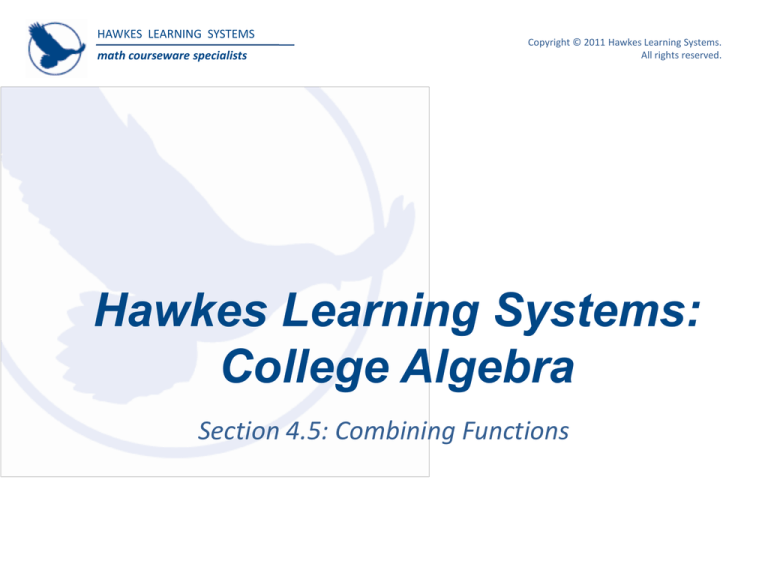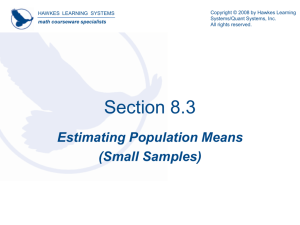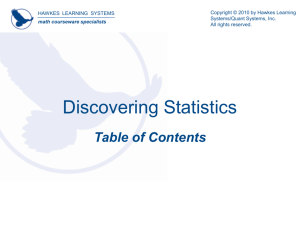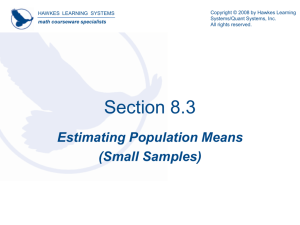
HAWKES LEARNING SYSTEMS
math courseware specialists
Copyright © 2011 Hawkes Learning Systems.
All rights reserved.
Hawkes Learning Systems:
College Algebra
Section 4.5: Combining Functions
HAWKES LEARNING SYSTEMS
Copyright © 2011 Hawkes Learning Systems.
All rights reserved.
math courseware specialists
Objectives
o Combining functions arithmetically.
o Composing functions.
o Decomposing functions.
HAWKES LEARNING SYSTEMS
math courseware specialists
Copyright © 2011 Hawkes Learning Systems.
All rights reserved.
Combining Functions Arithmetically
Addition, Subtraction, Multiplication and Division of Functions
1. f g x f x g x
2. f g x f x g x
3. f g x f x g x
f x
f
, provided that g x 0
4. x
g x
g
The domain of each of these new functions consists of the common
elements (or the intersection of elements) of the domains of f and g
individually.
HAWKES LEARNING SYSTEMS
math courseware specialists
Copyright © 2011 Hawkes Learning Systems.
All rights reserved.
Example: Combining Functions Arithmetically
Given that f x 2 x 2 3x 4 and g x 2 x solve:
a. f g x
Remember that f g x f x g x .
f x g x
2 x 2 3x 4 2 x
2 x2 x 4
Continued on the next slide…
HAWKES LEARNING SYSTEMS
math courseware specialists
Copyright © 2011 Hawkes Learning Systems.
All rights reserved.
Example: Combining Functions Arithmetically
(cont.)
Given that f x 2 x 2 3x 4 and g x 2 x solve:
b. f g x
f x g x
2 x 2 3 x 4 2 x
4 x3 6 x 2 8 x
Remember that
f g x f x g x .
HAWKES LEARNING SYSTEMS
math courseware specialists
Copyright © 2011 Hawkes Learning Systems.
All rights reserved.
Example: Combining Functions Arithmetically
Given that f 2 4 and g 2 3 find a. and b.
a. f g 2 f 2 g 2
Remember that f g x f x g x .
4 3
7
f 2
f
b. 2
g 2
g
4
3
f x
f
Remember that x
.
g
g x
HAWKES LEARNING SYSTEMS
math courseware specialists
Copyright © 2011 Hawkes Learning Systems.
All rights reserved.
Composing Functions
Composing Functions
Let f and g be two functions. The composition of f and
g, denoted f g , is the function defined by
f g x f g x .
The domain of f g consists of all x in the domain of g
for which g(x) is in turn in the domain of f. The function
f g is read “f composed with g,” or “f of g.”
HAWKES LEARNING SYSTEMS
math courseware specialists
Copyright © 2011 Hawkes Learning Systems.
All rights reserved.
Composing Functions
Caution!
Note that the order of f and g is important. In general,
we can expect the function f g to be different from
the function g f . In formal terms, the composition of
two functions, unlike the sum and product of two
functions, is not commutative.
HAWKES LEARNING SYSTEMS
Copyright © 2011 Hawkes Learning Systems.
All rights reserved.
math courseware specialists
Composing Functions
The diagram below is a schematic of the composition of
two functions. The ovals represent sets, with the
leftmost oval being the domain of the function g. The
arrows indicate the element that x is associated with by
the various functions. f g
g
x
f
g x
f g x
HAWKES LEARNING SYSTEMS
math courseware specialists
Copyright © 2011 Hawkes Learning Systems.
All rights reserved.
Example: Composing Functions
Given f(x) = x2 and g(x) = x + 5 , find:
a. f g 6
g 6 6 5 11
f
g 6 f g 6
f 11
= 112
= 121
First, we will find g(6) by
replacing x with 6 in g(x).
Next, we know that f composed
with g can also be written
f g 6 . Since we already
evaluated g(6), we can insert the
answer to get f(11).
Continued on the next slide…
HAWKES LEARNING SYSTEMS
Copyright © 2011 Hawkes Learning Systems.
All rights reserved.
math courseware specialists
Example: Composing Functions (cont.)
Given f(x) = x2 + 2 and g(x) = x + 5 , find:
Again, we know by definition
b. f g x f g x
that f g x f g x .
f x 5
Note: since we solved for the
= (x +
5)2 +
2
= x2 +10x + 25 + 2
= x2 +10x + 27
variable x we should be able to
plug 6 into x and get the same
answer as in part a. Verify this.
HAWKES LEARNING SYSTEMS
Copyright © 2011 Hawkes Learning Systems.
All rights reserved.
math courseware specialists
Example: Composing Functions
Let f(x) = x – 6 and g(x) =
find the domain for:
. Simplify the composition and
g f
g f x
= g(x – 6)
=
Domain: [6, )
The domain of g f must be any x
such that x – 6 > 0 since x - 6 is
under a radical.
HAWKES LEARNING SYSTEMS
Copyright © 2011 Hawkes Learning Systems.
All rights reserved.
math courseware specialists
Decomposing Functions
Often functions can be best understood by recognizing
them as a composition of two or more simpler
3
functions. For example, the function h x x 2 can
be thought of as the composition of two or more
functions.
Note: if f x x3 and g x x 2 then:
f
g x f g x f x 2
x 2
3
h( x).
HAWKES LEARNING SYSTEMS
Copyright © 2011 Hawkes Learning Systems.
All rights reserved.
math courseware specialists
Decomposing Functions
Ex: The function f x 3 3x 2 5 can be written as a
composition of functions in many different ways. Some of
the decompositions of f(x) are shown below:
3
g
x
x
a.
g h x g 3x 2 5 3 3x 2 5 f x
h x 3x 2 5
b. g x 3 x 5
h x 3x 2
c. g x 3 x
h x 3x 5
i x x
2
g h x g 3 x 2 3 3x 2 5 f x
g h i x
g h x2
3 3x 2 5
g 3x 2 5
f x
HAWKES LEARNING SYSTEMS
Copyright © 2011 Hawkes Learning Systems.
All rights reserved.
math courseware specialists
Example: Decomposing Functions
Decompose the function f x x 4 5 1 into:
a. a composition of two functions
g x x 1
4
4
g
h
x
x
5 1 f x
g x 5
4
h x x 5
b. a composition of three functions
g x x 1
h x x 5
i x x4
g h i x g h x4
g x4 5
x4 5 1 f x
Note: These are NOT the only possible solutions for the
decompositions of f(x)!






